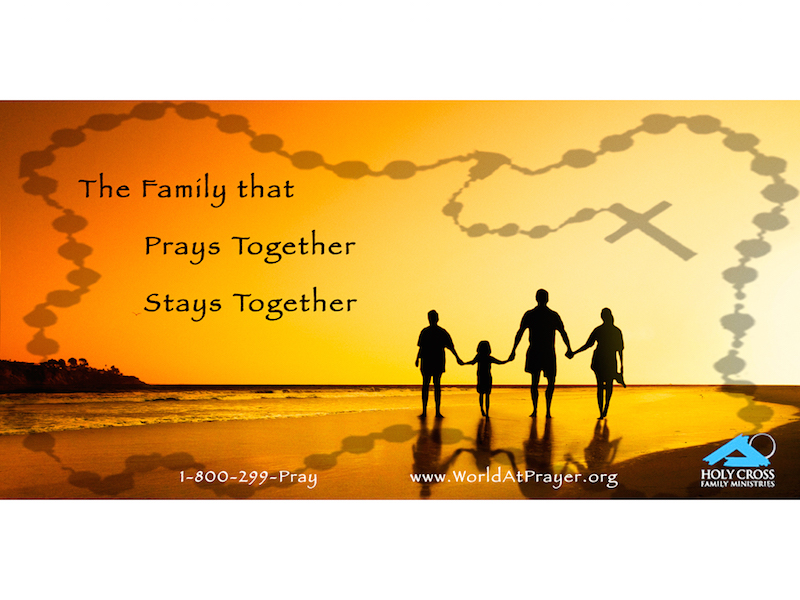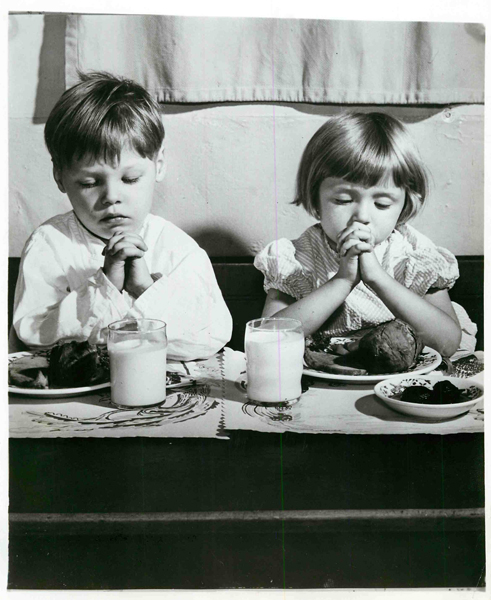
Holy Cross Family Ministries, the organization behind the famous slogan, “The family that prays together stays together” commissioned the study, “The Catholic Family.” Photo courtesy Holy Cross Family Ministries.
(RNS) Most of today’s American Catholic parents don’t go to Mass, provide any Catholic education for their children or stress the basic sacraments beyond baptism.
And yet a new study of these families finds good news: “They still have a relationship with God and pray for their family,” said a co-author of the research, Mark Gray at the Center for Applied Research in the Apostolate.
This heartens Susan Wallace, marketing director for the Holy Cross Family Ministries, the organization behind the famous slogan, “The family that prays together stays together.” It commissioned the research in advance of Pope Francis’ September visit to the World Meeting of Families in Philadelphia and the Vatican’s October meeting to conclude the church’s Synod of Bishops on the Family.
“Clearly, it’s a good news/bad news situation,” said Wallace. “But we know the challenges and now that we are not in the dark, we can provide resources to address them. If we are looking to build the future, we need to shore up young families.”
Among the study’s findings — and challenges:
- One in three did not find it very important to them that their children celebrate their First Communion. One in four didn’t consider it very important that they be confirmed. These are red flags for the future, said Gray. “If you don’t have First Communion and you’re not confirmed, you are more likely to leave the faith as an adult. You can’t take Communion or really practice your faith.”
- 68 percent of Catholic parents do not take their children to a Catholic school, parish religious training or even a Catholic youth ministry. This is significantly less than in previous generations, based on CARA surveys of adults reflecting on their religious education, said Gray. Wallace called the finding “staggering.”
- Less than half (49 percent) pay any attention to Catholic information sources in any form.
- Only 16 percent of parents pray the rosary at least once a month and 7 percent at least once a week.
That’s a shocker for Holy Cross, a ministry founded by “the Rosary Priest.” The late Rev. Patrick Peyton was a radio and film ministry pioneer who held “rosary rallies” and began his national media outreach and billboard campaign in 1947 with the slogan “The family that prays together stays together.”
The survey, which also looked at family media consumption, raised the rhetorical — and unanswered — question: “How will they come to know what their faith is about? Wikipedia? Siri?”
The survey was conducted in September and October 2014 with 1,014 self-identified Catholic parents. The margin of error is plus or minus 3.1 percentage points.
On the positive side, the research found:
- Around eight in 10 are sure “without doubt” about the Catholic view of God, Jesus, Mary, heaven and that their prayers are heard and answered. But one in four have doubts about the existence of hell.
- 53 percent of parents attend Mass at least once a month — slightly better than Catholic adults overall (43 percent).
- 51 percent of parents say they eat dinner together every night, something Wallace translates as an opening for encouraging prayer. “What a beautiful time — breaking bread together — to say a simple prayer and share how they said ‘yes’ to God that day.”
But Wallace honed in particularly on the findings on prayer.
Three in four parents (76 percent) say they pray every day — and they pray first and foremost for the well-being of their family.
But most also say they pray alone. Only about one in four pray with their family. And here, Wallace sees an opportunity. “What we need to do is help them imagine what it could be like if they prayed together.”
Wallace said, “If you look at the peace that comes into your heart from prayer, if we do it as a family, we have more peace and harmony in our home, the basic church. If the family is in harmony, it flows into the world.”
LM/AMB END GROSSMAN





